SLAP and Occupy Wall Street!
This is a collection of SLAPatista’s stories and thoughts on the #OccupyWallStreet movement and shows how students and young people are getting involved locally.
SLAP and Occupy Wall Street! By Chris Hicks, National SLAP Coordinator
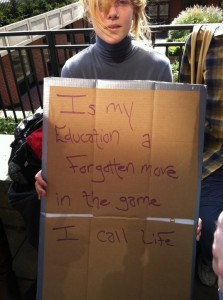 A student recently asked me “A year from now, how will we talk about what happened on Wall Street?” That is the moment I began to look at the Occupy Wall Street movement differently.
A student recently asked me “A year from now, how will we talk about what happened on Wall Street?” That is the moment I began to look at the Occupy Wall Street movement differently.
The media blackout that was originally cast by mainstream news has at this point been evaporated by the boiling excitement driven by the youth. Since September 17th and today, over 300 occupations happened in solidarity with those in New York City.
Occupy Wall Street is no longer just civil disobedience, but a movement. This is a movement that won’t go home just because it’s cold; that won’t go home because they’ve been pacified by a small piece of legislation; we are calling for a change. The media and politicians keep mocking those who are participating in our democracy by pointing out that we haven’t presented a clear list of demands. Those of us that have slept in parks, that have been a part of hours long General Assembly meetings, and that have had to stand up to police and demand our right to be in public spaces have all been fighting for something that is very clear.
What the mainstream media has failed to understand is that what the youth, the workers, and the unemployed want is justice. This is a justice that has been denied to many of us in our lifetimes – an idea that we once heard of but have never known. The issues that so many of us fight for can all be traced back to the same small group of people: it’s the corporate lobbyists that have prevented any meaningful change to immigration laws; it has been the corporations that have scaled back workers rights; it has been the corporations that have drowned college graduates in debt. For the first time in my life, we have been able to step back from our single issues and collectively look at who is responsible for the injustice we face daily and say, “It’s time to make Wall Street pay.”
We are not demanding reform. We are not demanding that the current system left to us be improved. We are demanding transformative and fundamental change. We are acknowledging that the current system has not worked for us, and that we need something new if we are to going to create a sustainable future.
When we look back a year from now and ask, “What happened at Wall Street?” it’ll be very clear. We stood against those that oppress and said “Enough.” We will not stand by as Verizon tries to cut workers’ healthcare, as Walmart refuses to treat our communities and their own Associates with respect and dignity, as our universities pay more than ever in corporate contracts while pricing students out of school, and we will demand new jobs to care for the elderly that our healthcare system has exploited. We’ll look back on this in a year and say, this was the time we stood up together and held those responsible accountable to us.
My generation is facing record debt and record unemployment but we finally found an occupation. Thankfully, it’s one that no one can take away from us.
Occupy Together, Occupy Forever: UMass Amherst by Ben Bull, UMass SLAP
 “It’s 12:03, something needs to happen,” and with those words from National SLAP Coordinator Chris Hicks, I found myself starting the Occupy Amherst, one of the many Occupy events popping up across the nation in response to Occupy Wall Street. A few minutes prior, I had marked myself as one of the “organizers” for the UMass Student Walk-Out before ten students. The event had hurriedly put together, and the only “organizing” I had done for the day’s event was show up with a UMass SLAP banner and a desire to join a nationwide movement against corporate greed. Yet, as the crowd gathered outside the library in anxious anticipation, I felt the call to act.
“It’s 12:03, something needs to happen,” and with those words from National SLAP Coordinator Chris Hicks, I found myself starting the Occupy Amherst, one of the many Occupy events popping up across the nation in response to Occupy Wall Street. A few minutes prior, I had marked myself as one of the “organizers” for the UMass Student Walk-Out before ten students. The event had hurriedly put together, and the only “organizing” I had done for the day’s event was show up with a UMass SLAP banner and a desire to join a nationwide movement against corporate greed. Yet, as the crowd gathered outside the library in anxious anticipation, I felt the call to act.
“Students, welcome, to Occupy Amherst!” I shouted as I jumped atop a railing to overlook the crowd. A great cheer erupted from my brothers and sisters of UMass, and I knew then that this march would be different than any other I had experienced. The students before me were ready, ready for action, ready to fight, ready to stand-up against big banks and corporations and government officials who have long neglected the needs of our communities. “I can’t afford a lobbyist,” I announced to the crowd, “But you know what, I’ve got the best lobby group right here, right here at UMass Amherst. This is the people power, this is the only lobby group I need. Every single one of you, coming together, we’re starting a movement. It started in New York, it was in Boston this past weekend, and now we are taking it to every town, every city, every street in the county.”
After a few rousing chants of “The People United, Will Never Be Divided” and “We Are the 99%” the students slowly started our mile and half long march to the center of Amherst. As we passed by our administration building, we stopped for a few minutes to protest rising student fees and the anti-union practices of the University. Moving out of campus and into the Amherst town, passing cars honked their horns in support. Some drivers quickly parked their cars and joined the line in song and chant. As we approached the main avenue into the center of town, the crowd erupted in a chant of “Our City! Our Streets!” and moved off the side walk and into lanes of traffic. At first, I was bit nervous and ran ahead towards an oncoming police car to engage the officer. Having been the only person tagged with the “organizer” label, I half expected to be arrested or given a citation. However, the police co-operated and let us pass.
From store fronts up and down the streets, local business owners and workers came out and cheered us on as we made our way up to the town common. It was then I made the decision as the impromptu organizer to make an unannounced pit stop at the Bank of America, conveniently located right in the center of town. I waved the crowd towards the bank, and with the help of Chris Hicks, we moved the mass right up to the front doors. “Bank of America, Bad for America!” the marchers declared in unison.
Having protested Bank of America for a fair amount of time, myself and some of others quieted the crowd, and I called for us to move to the Common. We marched across the street, as stopped cars waved and cheered. Once at the Common, I found a nice park bench from which we could start the next phase of our rally. Stories are vital to social movements. Each and everyone of us has a story that connects us to the struggles we face. Telling our story is a liberating experience for the one telling, and an inspiring experience for those listening. Stories are the fuel of movements, they keep us going when it is darkest and give us cause for celebration when we win. Atop that measly park bench, I invited people to come and share their story.
Borrowing the “People’s Mic” from the Wall Street Occupiers, we engaged in forty-five minutes of story telling. People told stories of struggling to pay for school, of being arrested on the Brooklyn Bridge in New York, of family members suffering and sometimes dying because they can’t afford healthcare; all were powerful in their own right. As I patrolled the crowd, I saw people excited by the possibility of creating change and reveling in the sense of solidarity felt with others. I know I had never been so excited at the chance of genuine social movement happening in my life time.
The Occupy Movement is very exciting and presents a glimmer of hope for the 99% of Americans who have long been abused by elites and ignored by politicians. Yet, as I write this, police moved into Boston and cracked down on Dewey Square protesters. I suspect such actions to follow in other cities, but we must not be deterred. This is our time. As a member of UMass SLAP, a union member, a member of the Amherst community, and as a citizen of the United States, I am resolved to see this through till the end. We are planning for more Occupy events here in Amherst in the coming weeks, and I know our numbers will only continue to grow.
A word to my fellow SLAP organizers: let us not neglect our existing campaigns in the rush to Occupy. Instead, let us use the Occupy to spread the word about on-going labor and student struggles in our communities. It would be irresponsible on our part if we did not use the people power of the Occupy to secure needed victories. Here in Amherst, we are using the Occupy to promote a Responsible Employer Policy at UMass and also rally community support to secure the RA Union and the Post-Doc Union fair collective bargaining agreements. We must use this occasion to win, and we will win. We have no choice, but to win.
A Solidarity with Occupy by Isaiah Toney, George Washington University SLAP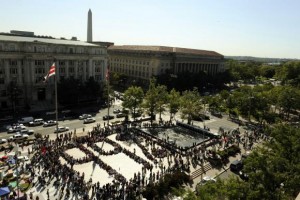
Occupy DC in Washington, D.C. started on October 1st with the specific objective of… well, we aren’t quite sure. Writing this on October 11th after having spent five evenings and two nights in McPhereson Square with the Occupy DC encampment has brought me to a new understanding: that we aren’t quite ready to know what to do yet. We’ve tried social programs and bailouts and charity and political structures to amplify the voices of the disenfranchised and all the other things that I don’t even know about. I like the humility of the thing.I have spent the past year trying to organize my fellow students in the DC area to work across campuses and the most powerful and passionate moment that I have had thus far was on Saturday, October 8th when a group of about 35 students from American University, Georgetown University, The George Washington University, and Howard University got together and decided that we wanted our campus communities to be behind the Occupy DC struggle. We are planning a Student Day of Action in Solidarity with Occupy DC on October 28th and we hope that our fellow students can join us in standing up however they see best for their own communities.
In spending time with folks who are trying to change the lot of the lowest in our society I have learned a new expression of Solidarity. I remember working on a group project with fellow students of mine describing a sociological concept that we had not come across in our studies, but that we thought could prove useful. This new Solidarity fits in that it is a group defined sense or awareness; but not based upon race, religion, gender, ability, class, ethnicity, or any group that we normally define. It is almost a shared spirituality- one based upon a deep desire for justice and a commitment to be a part of the process that brings it about.
I have sat in meetings of hundres of people that lasted nearly three hours because we used the “human mic” to ensure that all were heard. I have been woken by police officers just trying to give folks a hard time in the middle of the night. I have seen four hundred people wait for the police to disperse before continuing their march on city streets, slept next to friends that I had just met, and I can confidently say made the world just a little better- a tiny peep in the global chorus.”
I ran into a friend of mine from a local state university this past weekend. She had started school hoping to graduate in four years and try to enter a program for a teaching credential so that she could go back home and teach elementary school. She was not trying to get rich, powerful, or famous; she just wanted to do something good and live with dignity. I like the humility of the thing. It is my hope that the Occupy Struggle here in Washington, D.C. as well as across this country and this world can be a part of helping people like my friend be able to afford to go back to school, do her community justice, and fundamentally change the world into a place in which every human being has a chance to succeed.
We Will Not Move: Occupy Eugene by Jeremy Hedlund, University of Oregon SLAP
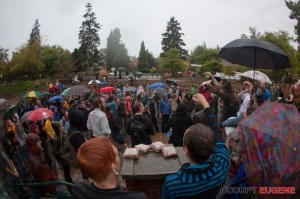 I started out very cynical about the Occupy movement. What could 200 activists camping in a park do to change anything? I figured they would quit after a week.
I started out very cynical about the Occupy movement. What could 200 activists camping in a park do to change anything? I figured they would quit after a week.
But they didn’t.
Slowly, their numbers grew. As they did, a tiny kernel of hope formed inside me. I wouldn’t let myself recognize it, still believing their cause hopeless and their numbers too few, but they persisted. Suddenly, the NYPD decided to violently suppress the occupiers, and the world was watching. Solidarity protests began to be organized almost immediately in cities across the country, and eventually the world.
I realized that this movement was something different when my parents called me to say they were going to be at Occupy Portland, and wished me luck at Occupy Eugene. They also told me to call if I needed bail money, and to try to stay dry while I was camping out.
Now, here in Eugene, Oregon, we’re four days away from the beginning of our occupation, and the Student Labor Action Project at the University of Oregon will be out there in force. Hundreds of students and community members have come together at three general assembly meetings (two of which were uncovered in the pouring rain), and recognized our mutual struggle: that corporations are hijacking our political system, and are actively fighting against social justice for workers, immigrants, and the community at large. We expect at least 500 people to march with us, and I know that I’ll come armed with a sleeping bag and a tarp.
We will not move. We will not stop fighting. And we will win.
We are the 99%: Occupy Orlando by Yesenia Garcia, UCF SLAP 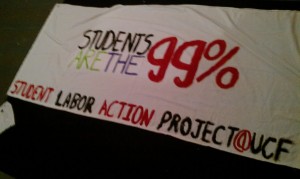
This October the occupation movement has come to Orlando, FL and SLAP@ the University of Central Florida is coming out to demand that the executive class stop putting corporate greed before working families’ access to higher education. This Saturday, Oct 15th, representatives of the 99% will occupy a public park in downtown Orlando in front of the Orlando Chamber of Commerce. In preparation for the occupation, SLAP has been working to engage students at UCF to come out strong in support of the movement. SLAP students have been involved in the general assemblies leading up to the occupation, and many of us will take facilitation roles during the occupation to ensure that it remains a safe and productive space to voice student concerns.
On campus, SLAP has taken a leading role in recruiting students to come to Occupy Orlando. We have done this through a tabling campaign where we have talked to students about the occupation movement, how corporate greed and its prevelency in government affects the lives of students, and why their involvement in the movement is important to ensuring that working peoples’ voices will be heard before legislators decide to continue their assult on working families. A central componenet of our tabling campaign has been our banner-petition. It reads “Student are the 99%,” and will fly over the occupation with the signatures of hundreds of students who support the nation-wide occupation movement. Additionaly, on October 25th, SLAP will be holding a march and rally on campus named “Occupy UCF” in solidarity with the movement.
What has been most exciting about Occupy Orlando for us has been the incredible response from students who have never organized before. The occupation movement has brought forth young people who are frustrated and have finally been pushed into the streets. Meeting these many new faces has been extraordinairily inspiring. Much like in Wisconsin, young people have proven to be an important aspect in the catalyst for social change. All of the young faces who will be at the occupation are proof that working people will no longer stand for the status quo model of profit over people, business over workers, and executives over students. As student organizers, it is our duty to keep this new infusion of energy into the social justice movement continuing, and keeping all of our new comrades engaged. On Saturday in Orlando, Central Floridians will occupy a public park which those who work at the Chamber of Commerce enjoy overlooking from their offices every day. Among the sea of faces they will see in the coming months will include SLAPatistas and other students who have finally decided that enough is enough. We will no longer stand for thse attacks, and over the next coming months, we and all those we represent will make that clear.
Banks Got Bailed Out, We Got Sold Out: Occupy Boston by Justine Zayhowski, Brandeis SLAP
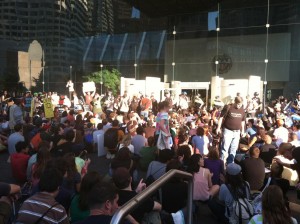 Being a generally pessimistic person, I was initially surprised to say how inspired I was by my first encounter with Occupy Boston at the Student General Assembly. Here, was a group of students from schools all around the greater Boston area coming together in support of the occupation; this motivated, compassionate student body came out to say “enough is enough.” At this point I was drawn in and have spent some time almost every day in Dewey Sq. This Student GA led to the creation of a student tent and a Student March on Monday of about 5,000 people.
Being a generally pessimistic person, I was initially surprised to say how inspired I was by my first encounter with Occupy Boston at the Student General Assembly. Here, was a group of students from schools all around the greater Boston area coming together in support of the occupation; this motivated, compassionate student body came out to say “enough is enough.” At this point I was drawn in and have spent some time almost every day in Dewey Sq. This Student GA led to the creation of a student tent and a Student March on Monday of about 5,000 people.
Around 1 AM early Tuesday morning, about 130 people were arrested for occupying Rose Kennedy Park. A student from my school, Brandeis University, was among them. This just further shows how students have participated in all aspects of the movement. This morning, Mayor Menino spoke on WBUR saying that he would “make a decision about the end of the encampment in the ‘near future’” (WBUR). Yet, going back to Occupy Boston this afternoon, I got the impression that the end is nowhere near. The square is still occupied; people are still sharing stories, making signs, and getting honks of support from cars passing by. Talking to people involved, I’ve realized the movement has so much momentum, so much power, and is comprised of so many dreams it would be extraordinarily difficult to truly end Occupy Boston. The shared vision of change, in the least, will always remain.
This is not a movement of “youngster hippies” but of people coming together from all walks of life to say “we need a fundamental change, this is not working.” Occupy Boston has started conversations between people who may otherwise have never had them. It has brought all of us together, many people with many needs, to show the world we are the 99%.

[…] a joint effort of the United States Student Association and Jobs With Justice, has posted a set of OWS reports from student activists at U Mass Amherst, George Washington University, the University of Oregon, the University of […]